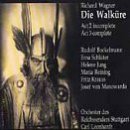| All Artists: Wagner, Bockelmann, Leonhardt Title: Die Walkure Members Wishing: 0 Total Copies: 0 Label: Preiser Records Release Date: 8/23/1994 Genre: Classical Style: Opera & Classical Vocal Number of Discs: 2 SwapaCD Credits: 2 UPC: 717281902076 |
Search - Wagner, Bockelmann, Leonhardt :: Die Walkure
CD Details |
CD ReviewsWagner for the connoisseur B. Cathey | Wendell, NC United States | 02/10/2004 (4 out of 5 stars) "For years opera lovers--and Wagner addicts in particular--had mainly the famous HMV recordings of Wagner's Die Walkuere from 1936-38, plus a "live" Covent Garden Act III under Wilhelm Furtwangler, and various short snippets, to document how singers approached perhaps what is Wagner's most popular Ring opera during the 1930-1945 period. Some collectors had access to MET off-air transcriptions, with wonderful performances of Walkuere directed by Bodanzky and Leinsdorf in the late '30s and early '40s. Then, there were the "potted" Ring excerpts from the late '20s.
The unearthing of the treasures of German Reichsrundfunk Archiv (and the return of other items, seized by Soviet troops in 1945), has added considerably to our knowledge of performance during that period. This 1938 Die Walkuere, in really quite fine sound, does not include Act I, and Act II is cut, but the listener hears enough of this performance, which was most likely done for radio re-broadcast, to know that it is generally very good. The two stars are undoubtedly Rudolf Bockelmann (as Wotan) and Erna Schluter (as Brunnhilde). Bockelmann, known widely for his outstanding Kurwenal in the earlier Bayreuth Tristan under Karl Elmendorff and for his admired Hans Sachs, is magnificent throughout, and most of his music (with some unfortunate cuts in the second act monologue, notwithstanding) is given. Here is a supreme artist, who, but for the politics of World War II, might be better appreciated. Schluter, unlike Bockelmann, gave performances after World War II. Indeed, her Isolde (from 1948) is largely preserved and has been issued on CD. Here she is a very fine Brunnhilde, perhaps paling in comparison with her contemporaries, Flagstad and Leider, but who, after all, could compare to them? Still, she is very good. The Siegmund is Fritz Krauss, here well past his prime, but still an accomplished artist; one hear's age in his voice, but he still manages well enough. Maria Reining, fresher and younger than in the more familiar Rosenkavaliers from the late 1940s and early '50s, is quite good as Sieglinde. And Josef von Manowarda, one of Germany's finest bassos, takes the small role of Hunding. The Stuttgart Radio Orchestra plays well enough, if without the intensity of a Furtwangler. The sound, as I said, is quite good throughout. In short, to better understand Wagnerian performance of the period, to enjoy Bockelmann's fine etched Wotan and Schluter's Brunnhilde, this is a set you may wish to investigate." |

